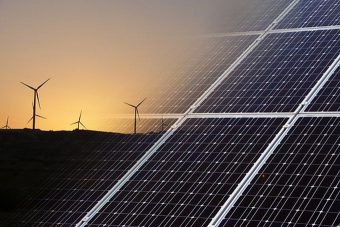
The EU is on track to meet its goal of sourcing 20 per cent of its energy from renewable sources and is successfully displacing fossil fuels through its increased use of renewables.
That is the conclusion of a new report from the European Environment Agency which details how renewables’ share ot the European energy mix is approaching 17 per cent and has led to a reduction in greenhouse gas emissions across the bloc of around 10 per cent since 2005.
The report, entitled Renewable energy in Europe 2017: recent growth and knock-on effects, provides granular data on how the EU’s transition to a cleaner energy mix has evolved in recent years, as the bloc’s reliance on coal has reduced and energy developers have increasingly focused on bringing renewables projects online.
The study notes how renewables share of the energy mix rose from 15 per cent in 2013 to 16 per cent in 2014, before then rising again to 16.7 per cent in 2015. The trend is set to continue with renewables accounting for 77 per cent of all new electricity-generating in 2015 – marking the eighth year in a row renewables provided the majority of new capacity. The report calculates that the surge in renewables capacity means that since 2005 EU greenhouse gas emissions have fallen by 10 per cent – equivalent to the domestic emissions of Italy.
“The speed at which renewable energy has grown since 2005 took many market actors by surprise, especially within the power sector,” the report states. “While fossil fuel capacity needs to be decommissioned at a faster rate to ensure that the EU avoids stranded assets or a lock-in of carbon-intensive power plants by 2030, the rate of replacement of carbon-intensive energy sources by RES to date has already resulted in GHG emissions reductions in the EU electricity sector, in the consumption of energy for heating and cooling, and in transport.”
The report comes ahead of a European Parliament vote this week on the bloc’s budget through to 2020, which will see environmental campaigners call for more funding for climate action and clean energy deployment.
The vote covers proposals for the mid-term revision of the seven year budget from 2014, which acknowledges concerns the bloc could miss its long term carbon targets, but proposes no new concrete steps for addressing the potential shortfall.
Markus Trilling, policy coordinator at the CAN Europe coalition of green NGOs, urged MEPs to deliver a climate friendly budget.
“Tomorrow the European Parliament must ensure that the EU budget which was approved three years before the adoption of the Paris Agreement aligns itself towards achieving the long-term targets of the Paris climate Agreement,” he said. “Contrary to the European Commission revision proposal, the European Parliament’s position should take measures not only to meet, but to increase the climate earmarking.
“It should also push for the implementation of a framework for climate proofing and for the phase out of any support to fossil fuels.”
Source: businessgreen.com

